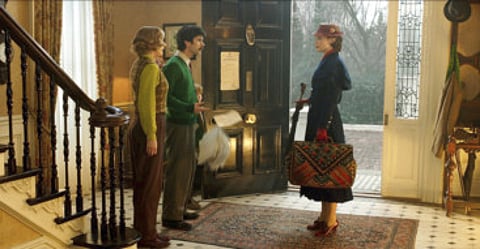Why we need ‘Mary Poppins’ more than ever
Makers of the new film say they want to reintroduce joy at a grim moment in history

It is fairly well known that PL Travers, who wrote the eight original Mary Poppins books, hated the 1964 Disney film adaptation. The animation, the Hollywood version of Edwardian England, the playful verbosity of the songs and above all, the presentation of Mrs Banks as a larky suffragette are understood to have enraged the Australian author, as, surely would this: the co-option of Mary Poppins as a feminist.
It is an irritating reflex to take beloved figures from childhood fiction and bend them to adult political ends, but it is particularly perverse in the case of Poppins, given her creator’s dislike of piety. The original Poppins is not quite the spit-spot version with whom most of us are familiar, but a far darker, more irregular creature, powered in places by what reads as sublimated rage and inclined to embrace something that sails close to atheism.
None of which is to say that Travers was right to despise the Disney version. After many years of not watching or thinking about the movie, I have been forced to re-engage with it as my children work their way through the Disney back catalogue and in anticipation of ‘Mary Poppins Returns’, the Emily Blunt reboot, directed by Rob Marshall. What strikes me is how devastating the original film was.
Poppins is a cipher at the heart of the movie who exerts influence not, as Mr Banks specifies in his advert in the Times, by being a “nanny who can give commands”, but in accordance with the principle that one changes others by changing one’s behaviour around them — in the case of Poppins — through a combination of beady observation and strategic obliviousness. She is impatient, indignant, above all incredulous when presented with the weakness of others. (“Are you unwell?” she asks Mr Banks after doing some light magic at him and in what we would, these days, identify as gas lighting.)
What is the purpose of this? The movie implies that Poppins is part of the long-standing dramatic tradition of the stranger as agent of moral change. One can laugh at the cod-profundity of the lines, but the opening scene — the best bit of acting Dick Van Dyke does in two hours — in which Bert glances eerily up at the sky, sets the uneasy tone for the film: “Wind’s in the east / Mist coming in / Like something is brewing, about to begin / Can’t put my finger on what lies in store / But I feel what’s to happen all happened before.” There is wonder in this statement, but also a nod towards forces not entirely benign.
What is it she teaches the children? Empathy; mindfulness; a sneaky determination to win (at the horse race). Tidiness. Not to gush. Not to worry, overly, about whether or not they are liked. Simultaneously to believe and not believe what they see. As in the books, she denies to the children that anything magical has happened, inculcating scepticism and something worthwhile about view point.
In fact, scepticism is her greatest asset; a stand against credulousness and therefore systems, social and political, which would have the children mindlessly repeat what came before simply because it is familiar. And then she buggers off, truly a shocking moment of childhood. I remember the first time I saw this and could not believe a film was allowed to behave this way, break one’s heart so insistently then pretend the reunification of the Banks family was, in fact, a happy ending. No child I know bought into this. Poppins’ departure presages death and even as eight-year-olds, at some level, we knew it.
And so she will fly back into our lives this Christmas. The makers of the new film say it is their intention to reintroduce joy at a particularly grim moment in history, but with Poppins it was never a question of joy pure and simple. It was, instead, a question of joy against the backdrop of the film’s only certainty, that whatever happens, the wind will change. It is not much as reassurance goes, but it will have to do.
Don’t miss it
‘Mary Poppins Returns’ releases in the UAE on December 27.



